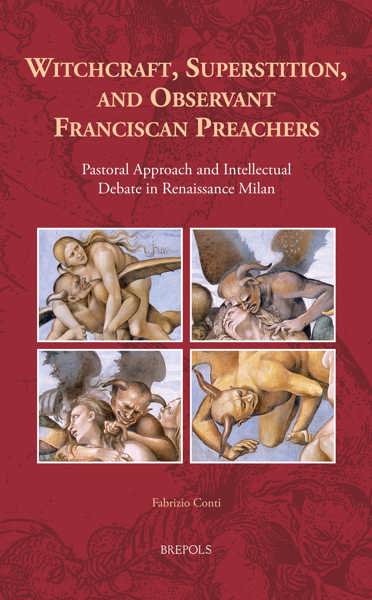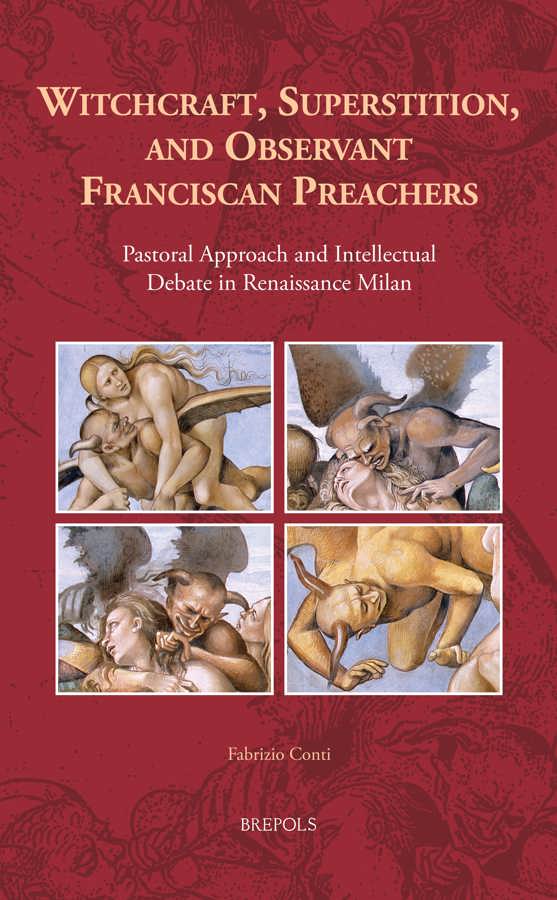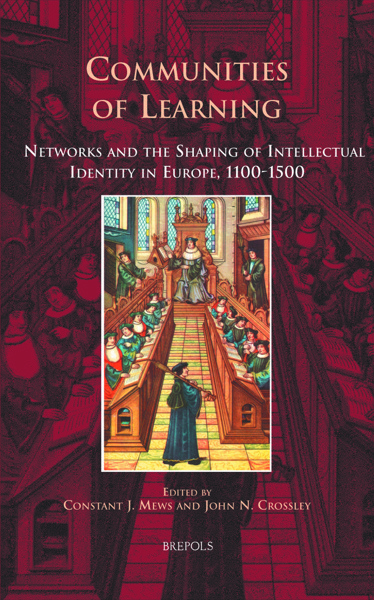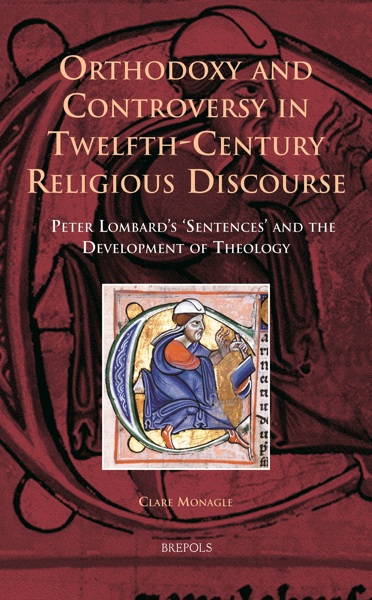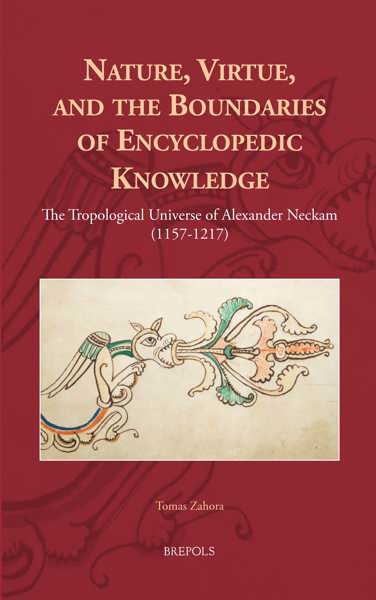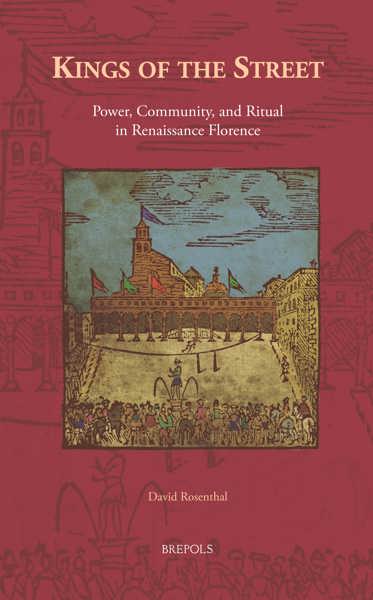
Witchcraft, Superstition, and Observant Franciscan Preachers
Pastoral Approach and Intellectual Debate in Renaissance Milan
Fabrizio Conti
- Pages: 380 p.
- Size:156 x 234 mm
- Illustrations:5 b/w
- Language(s):English
- Publication Year:2015
- € 120,00 EXCL. VAT RETAIL PRICE
- ISBN: 978-2-503-54919-4
- Hardback
- Available
- € 120,00 EXCL. VAT RETAIL PRICE
- ISBN: 978-2-503-55812-7
- E-book
- Available
Explores sermons and pastoral views on superstition and the reality of witchcraft in Renaissance Milan.
“(…) the book represents a solid contribution to showing the richness of model sermon collections for investigating European intellectual life and its transformations”. (Pietro Delcorno, in Medieval Sermon Studies, 60, 2016, p. 81)
"Indeed, Conti bridges the gap between the two different periods with his careful examination of pastoral texts. I hope this book will reach more readers and lead to new research.” (Yoko Kimura, in Archivum Franciscanum Historicum, 109/3-4, 2016, pp. 645-647)
“The main merit of the volume is its clear depiction of how official and unofficial beliefs about superstition and witchcraft appeared in Franciscan pastoral texts, and how the main arguments were systemized in the Observant Franciscan community. Conti’s detailed analysis provides a new perspective on superstition and witchcraft and a clear picture of an Observant Franciscan milieu in Northern Italy and Milan firmly rooted in less familiar sources.” (Borbála Lovas, in Reciti, 22.12.2016)
“It is a merit of Fabrizio Conti’s book to have traced some of the roots of the Catholic Church’s cautious handling of witchcraft prosecutions back to a tradition of selective skepticism among Observant Franciscan preachers.” (Matteo Duni, in Magic, Ritual, and Witchcraft, 11/2, 2016, p. 275)
“Conti (…) giunge a interessanti conclusioni (…), colmando così un vuoto storiografico (…) è proprio questa schiacciante presenza domenicana a rendere il libro di Conti meritevole di essere letto e discusso per uscire dagli schemi di categorie ormai logore.” (Michaela Valente, nella Bruniana & Campanelliana, 22.2, 2016, p. 657)
“Scholars of magic and witchcraft beliefs are an obvious and appreciative audience for this work, but this topic also engages two areas of particular interest among intellectual and religious historians. (…) This fascinating distinction suggests an avenue for further research about the development of skepticism derived from both intellectual and occupational formations. Conti’s research makes clear the rewards of studying pastoral materials as a part of the history of witchcraft and superstition.” (Lezlie Knox, in Renaissance Quarterly, LXX/2, 2017, p. 761-762)
[...] Fabrizio Conti’s study is a valuable contribution to the continuing research on the complex phenomenon of witchcraft in Renaissance Italy and it is a pleasure to read. It is particularly praiseworthy for its engagement with heretofore little known personalities and milieux and its exploitation of previously neglected sources". (Michael Tavuzzi, in Journal of Ecclesiastical History, 69/1, January 2018, p. 156-157)
“Mit seinem durch ein ausführliches Namenregister erschlossenen Buch legt Fabrizio Conti eine erhellende Studie vor, die den Blick auf die – weniger gradlinig als erwartet verlaufende – Genese des Hexenstereotyps schärft.” (Georg Modestin, in Schweizerische Zeitschrift für Religions und Kulturgeschichte, 2018, p. 421)
This book offers a new and innovative approach to the study of magic and witchcraft in Italy between the late Middle Ages and the early modern period. Unusually, this subject is explored not through inquisitorial trial records or demonological literature, but through the sermons and confession manuals produced by Observant Franciscan friars, focusing on the so-called ‘pastoral’ approach to folklore, superstition, and witchcraft — an approach that appears to have been notably less harsh than that taken by inquisitors and dedicated demonologists.
Central to this research are the writings of a number of friars active at the friary of St Angelo in Milan. Among them were preachers and confessors such as Bernardino Busti, who treated superstition as part of a model that categorized the beliefs and behaviours of the faithful, as well as dedicated intellectuals such as Samuele Cassini, who took scepticism towards elements of belief in witchcraft still further, ultimately leading to a clash with groups such as the Dominicans.
By considering the writings of these men in their wider literary and pastoral context, and in the light of the broader reforming aims of the Franciscans, this unique study not only offers new insights into the late medieval understanding of superstition and witchcraft, but also makes an important contribution to the history of pastoral care.
“Fabrizio Conti adds a valuable new perspective to these much-studied issues.” (Michael D. Bailey, in The Medieval Review, 16.06.29)
Preface
Part I. Preachers and Confessors at the End of the Fifteenth Century
Chapter 1. The Franciscan Observant Tradition and the Friars of St Angelo’s in Milan: Bernardino Busti and his Colleagues
Chapter 2. Bernardino Busti’s Rosarium Sermonum and its Pastoral Context
Chapter 3. Tallying Sins between the Thirteenth and Fifteenth Centuries: The Use of Classificatory Grids
Part II. The First Commandment and Superstition
Chapter 4. Superstition as a Problem of Divine Cult
Chapter 5. Fifteen Ways to Transgress Against God: The (Re-)Development of a Model for Classifying Superstition
Part III. From Superstition to Witchcraft
Chapter 6. Busti and the Malefici, or How the First Commandment Can Affect the Other Commandments of the Decalogue
Chapter 7. The Apparent Reality of Illusion: The Metamorphosis of Witches and the Ludus Dianae
Chapter 8. Flying with Demons: Samuele Cassini’s Questiones lamearum and the Clash with the Dominicans
Conclusion: A Pastoral Way to Superstition and Witchcraft
Appendix One. Samuele Cassini’s Epigrams for Busti
Appendix Two. Bernardino Busti’s Ten Commandments in Vernacular Verses
Bibliography
Index
